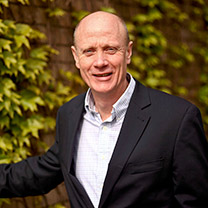
Prof. PAUL FREEMONT
IN VITRO SYNTHETIC BIOLOGY – USING CELL FREE SYSTEMS TO RAPIDLY ACCESS TO XENOBIOTICS IN A TEST-TUBE
ABSTRACT:
Cell-free transcription/translation systems (known as CFPS or TX-TL) have recently been re-evaluated as a promising platform for enabling synthetic biology research and applications. In particular CFPS has been shown to provide a reproducible prototyping platform for regulatory elements where measurements in vitro are in part consistent with similar measurements in vivo. The advantage of being non-GMO allows rapid automated assays for characterizing parts and genetic circuit designs for pathway engineering, natural product discovery and biosensor designs. My lab has been interested in exploring cell free extracts from different organisms and I will present our most recent work on cell-free systems. I will also present our recent studies on combining in vitro geno-chemtic strategies to allow rapid access to xenobiotic compounds which may provide improved therapeutic activity. By focusing on the violacein biosynthesis pathway and using seven different substrate analogues, we have been able to generate 66 new to nature analogues of violacein. Furthermore, 20 new derivatives were generated from brominated analogues via Suzuki-Miyaura cross-coupling reaction directly using the crude extract without prior purification. I will also discuss the generality of this approach.
BIOGRAPHY:
Professor Paul Freemont is co-director of the new EPSRC national Centre for Synthetic Biology and Innovation at Imperial College London. He is also currently the Head of the Division of Molecular Biosciences (since 2005) and holds the Chair in Protein Crystallography.
Previous to this, Professor Freemont was Head of the Imperial College Centre for Structural Biology (2000-2005) having joined Imperial from Cancer Research UK London Research Institute. His research interests have focused on understanding the molecular basis of a number of human diseases including cancer and he is the author of over 140 peer-reviewed scientific publications. Professor Freemont together with Professor Kitney (Dept. of Bioengineering) co-founded the EPSRC Centre for Synthetic Biology and Innovation in 2009. The Centre is the first of its kind in the UK and aims to develop an engineering framework and new technology platforms to enable synthetic biology research in areas of bioenergy, biosensors, biomaterials and metabolic engineering.
Professor Freemont has also held a number of external positions including membership of Royal Academy of Engineering enquiry into Synthetic Biology (2006-2008); member of Cancer Research UK Biological Sciences funding panel (2006-2011); current member of the Diamond Light Source Scientific Advisory Committee (since 2011); past member of Wellcome Trust Genes Molecules and Cells funding panel (2002-2005); past member of Wellcome Trust fellowships panel (2002-2005) and current Chair of London Structural Biology Consortium (since 2004). He is also a visiting Professor to the London School of Economics and Political Science (since 2011).
In addition to his academic activities, Professor Freemont is a co-founder of the spin out company Equinox Pharma Ltd (since 2003), sits on the Scientific Advisory Board of Netscientific Ltd (since 2011) and has held consultancies with a number of other companies and organisations including Scottish Enterprise, Syngenta and Rio Tinto. He has also been active in a number of public engagement activities including the RCUK Public Dialogue on Synthetic Biology (2010) and the Royal Academy of Engineering public engagement on synthetic biology (2008).
Along with Prof. Kitney, he has appeared regularly on radio and television broadcasts on the subject of synthetic biology.



